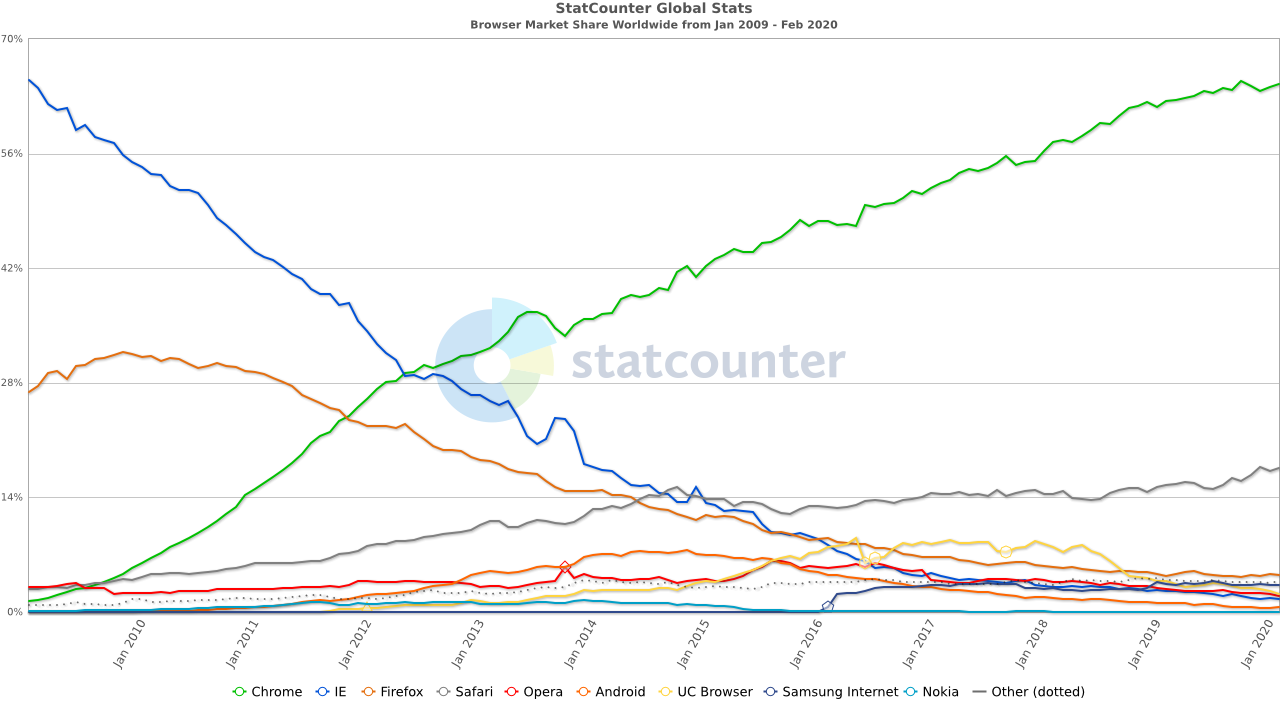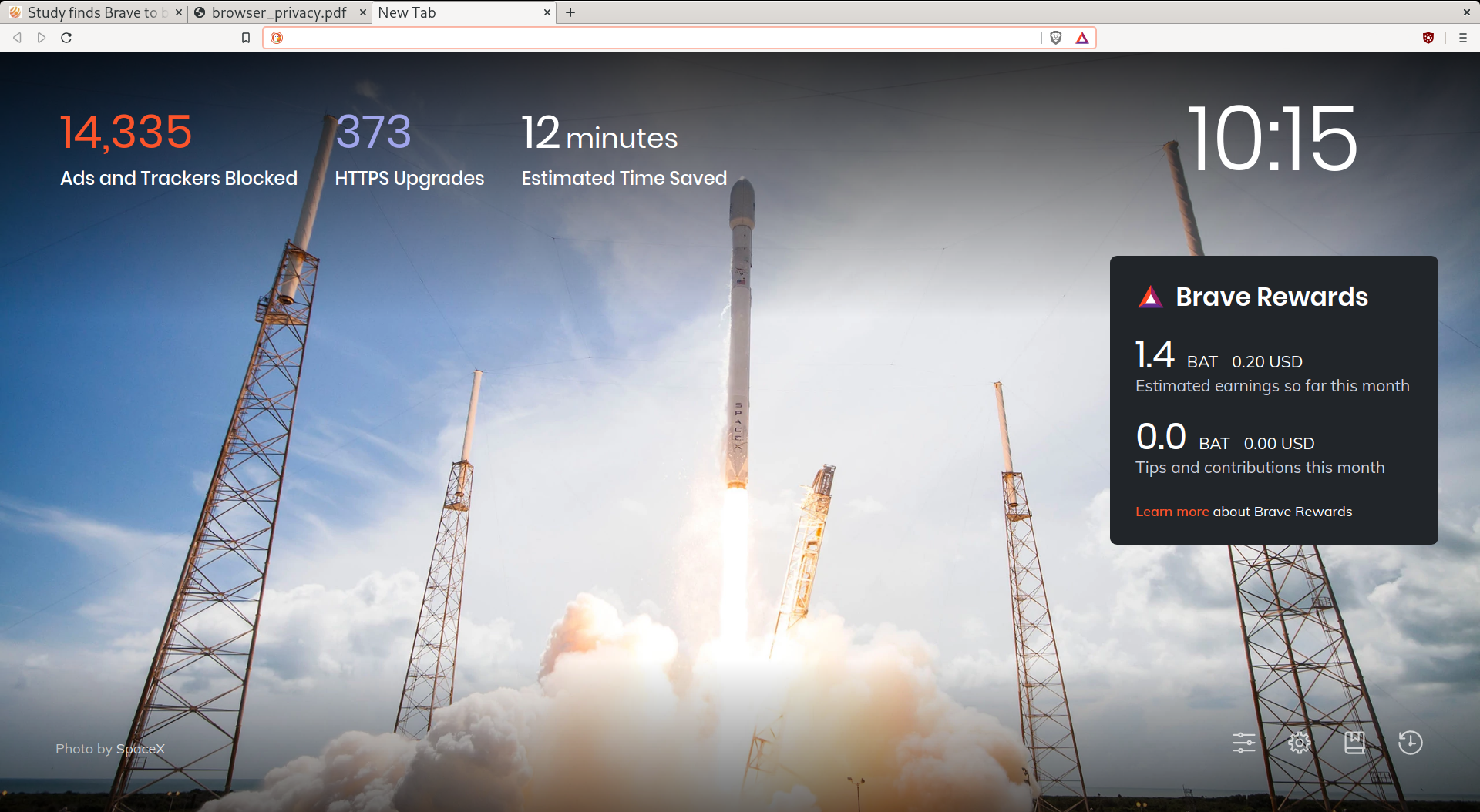
Switching to the Brave Web Browser
A lesson I learned while teaching my Mom some computer tricks is that I should probably begin with what a (web) browser is. To do this, I'll start with a somewhat technical definition from Wikipedia, "A web browser (commonly referred to as a browser) is a software application for accessing information on the World Wide Web." Great, now lets simplify that a bit. You will likely recognize names such as Chrome, Firefox, Edge or Safari; these are different browsers. You open it up and use it to shop on Amazon or Etsy; Duck things on duckduckgo; checkout stuff on Pinterest, Reddit or Facebook, etc. You tell the browser what you want to see by typing in an URL, (for example https://google.com) or more likely just type in a search term and off you go!
Hopefully you now recognize what a browser is but I imagine now you're wondering so what? Who cares what browser I use? For the most part it doesn't make much of a difference. They may use slightly different styling, or have some special feature you never use, but essentially they all take you to the same place. They connect you with websites and hopefully stay out of your way.
I will pick on Chrome for this paragraph because it is mostly developed by the largest internet advertising company on the planet, Google. If I remember correctly, Chrome was created to speed up web browsing and improve browser security. Around 2010 Internet Explorer was full of security holes and Firefox was slow and bloated so the user experience was not particularly good. Also, Google wanted to be sure that the Google search engine remained the default option at least in Chrome since search ads drive a great deal of their revenue; IE or Firefox switching their default search provider at the time could have been very harmful to Google's bottom line.
The green line on the chart below shows the change in Chrome's market share from 2009-2020. Today it controls roughly 65% of the browser market which gives Google a great deal of power in discussions about what standards are introduced and adopted and how they are implemented. Chrome is very slow to adopt the privacy features built-in to their competitor's browsers as they would negatively effect their advertising income. This allows them to better identify and track people in order to serve them more targeted advertisements and make more money.

Chrome is built on top of the open-source Chromium browser. Chrome is essentially Chromium with a Google sweatshirt. Everyone is free to use and change Chromium but that sweatshirt is hiding all of the extra stuff Google adds to build the proprietary Chrome. The source code is closed off so no one can see. You can think of Brave as Chromium with a completely different sweatshirt with all of its unique features open to everyone allowing us see, change and help improve it. So you get all of the security and speed benefits without most of the Google enabled tracking and privacy invading aspects of Chrome.
That is the basic building blocks of the Brave browser. The truly revolutionary portion is their long-term goal of replacing the massive user tracking and profiling system that currently powers the internet economy with a privacy preserving advertising system built into the browser. Most internet services such as Gmail, Facebook, Instagram, Tiktok, newspapers, magazines, blogs, etc are funded through advertising. This is why a service like Hulu has a free tier with advertising while Netflix always requires you to pay. The trouble is, this business model incentivizes massive amounts of surveillance across the internet.
"Google controls about 62% of mobile browsers, 69% of desktop browsers, and the operating systems on 71% of mobile devices in the world. 92% of internet searches go through Google and 73% of American adults use YouTube. Google runs code on approximately 85% of sites on the Web and inside as many as 94% of apps in the Play store. It collects data about users’ every click, tap, query, and movement from all of those sources and more."
Google and Facebook and dozens of other data companies encourage website owners to use their scripts on their websites so that they can track user activity everywhere they go on the internet and target them ads. By default, Brave blocks these trackers and identifying techniques to speed up browsing and protect users from this ridiculousness. Below is a list of tracking scripts blocked on a visit to the Milwaukee Journal Sentinel website. Amazon, Facebook, Google and a sea of others are all utilized; drastically slowing down the web page's load time and adding a lot of annoying pop ups and videos to the website.
What Brave Blocks on Milwaukee Journal Sentinel's website
31 Cross-site trackers blocked
- https://www.gannett-cdn.com/uxstatic/jsonline/uscp-web-static-4525.20.0/js/partner/show_ads.js
- https://try.abtasty.com/bcf3f16fe6dfff2da9b2400d218df47c.js
- https://cdn.taboola.com/libtrc/gannett-network/loader.js
- https://c2.taboola.com/nr/gannettcompany-jsonline/newsroom.js
- https://cdn.taboola.com/libtrc/static/thumbnails/3aadbb71016ecd7a194bbe2791777e9a.png
- https://confiant-integrations.global.ssl.fastly.net/r5TdgVvkbv-PeaJCKaQfCh5Xsto/gpt_and_prebid_v3l/config.js
- https://pubads.g.doubleclick.net/gampad/adx?iu=%2F7103%2Fswg%2Fpts_wi-milwaukee-C1258&sz=1x1&ref=&cookie=undefined&c=141688919367667&tile=1&u_tz=-300
- https://securepubads.g.doubleclick.net/tag/js/gpt.js
- https://c.amazon-adsystem.com/aax2/apstag.js
- https://cdn.adsafeprotected.com/iasPET.1.js
- https://js-sec.indexww.com/ht/p/184808-89514051626416.js
- https://www.gannett-cdn.com/partner/vendor/pbjsandwich-v1.min.js
- https://connect.facebook.net/en_US/sdk.js
- https://content-static.gannett.com/OpinionLab/oo_style.js
- https://content-static.gannett.com/OpinionLab/oo_engine.min.js
- https://static.adsafeprotected.com/iasADX.js
- https://7q1z79gxsi.global.ssl.fastly.net/7q1z79gxsi-m.js
- https://7q1z79gxsi.global.ssl.fastly.net/7q1z79gxsi-c.js
- https://dpm.demdex.net/id?d_visid_ver=3.1.2&d_fieldgroup=AAM&d_rtbd=json&d_ver=2&d_orgid=CF4957F555EE9B727F000101%40AdobeOrg&d_nsid=0&d_mid=24905135920613042071094820707358437236&ts=1584585491334
- https://cdn.krxd.net/controltag/suw9jm9mz.js
- https://cdn.parsely.com/keys/jsonline.com/p.js
- https://sb.scorecardresearch.com/beacon.js
- https://pixel.mathtag.com/event/js?mt_pp=1&mt_adid=114093
- https://www.googleadservices.com/pagead/conversion_async.js
- https://b-code.liadm.com/a-048w.min.js
- https://cdn.keywee.co/dist/analytics.min.js
- https://resources.xg4ken.com/js/v2/ktag.js?tid=KT%E2%80%90N2B92%E2%80%903EB
- https://connect.facebook.net/en_US/fbevents.js
- https://10870841.collect.igodigital.com/collect.js
- https://srepdata.jsonline.com/b/ss/globaldesktopmobilesite/1/JS-2.9.0/s0586757838856
- https://www.google-analytics.com/analytics.js
At this point you might be uneasy but still think, "hey, they need to earn money to pay for their reporting. There aren't that many options for decent, local, investigative journalism and the newspaper industry has been hammered over the years (by Google & Facebook as it turns out.)" This is where Brave stands out from the other browsers. Instead of just blocking ads, Brave users are able to earn money in the form of Basic Attention Tokens (BAT) for allowing Brave to display ads occasionally. You are able to adjust how frequently they appear and are not required to enable them; it is an opt-in choice. At this point, the ads display as notifications on your computer or phone and disappear after a few seconds. When ads popup, you earn 70% of the ad revenue while the other 30% goes to Brave providing them with a dedicated funding source. Firefox, the third most used browser, is another open source browser with some ad-blocking but they rely on search engine providers for a large chunk of their annual funding leaving them with an unstable year to year budget and an uncertain future. They face the same problem as newspapers: since less people are using them, they get paid less for the default search engine rights and have less money to compete.
Every month Brave distributes a user-adjustable percentage of your BAT to the websites you visit based on the amount of time you spent at each site. When the ad is displayed, you earn BAT; no need to click on the ad if you're not interested. The tracking and ad targeting is all done locally on your computer and is never sent anywhere or shared with anyone. This allows website owners and content creators to earn money without strong-arming users into giving information to Google and Facebook to sell to ad companies. When you browse Github, Reddit, Twitter or YouTube, the content creators are able to receive BAT instead of just the website operator. This means that Timmy will get BAT for his YouTube video when people watch it, not just YouTube.

Brave seems like a near perfect compromise that benefits users, advertisers and content creators. Users continue to get free content as well as the most private by default browser out there; advertisers can continue to sell their wares; content creators can earn money for endeavors; all without the massive, privacy invading, information dragnet currently in place. I hope to see Brave usage increase and more websites sign on; especially in Milwaukee. Some companies certainly seem to be on board as lately larger companie's ads are showing up. User growth appears to be healthy as well; passing 10 million last December.
Of the different Milwaukee websites I frequent, Urban Milwaukee seems to have the most balanced approach with less tracking for paid members compared to free users. OnMilwaukee.com unfortunately has no paid tier so tracking for everybody! Milwaukee Record uses broadstreetads.com which uses local advertising which is a plus. All three, regardless of tier, use the ubiquitous Google Analytics found on a large swath of the internet. Google Analytics monitors mouse movements, clicks, time spent on pages and much more; sending it all back to Google servers. The City of Milwaukee and Milwaukee County websites both have Google mixed in as well. Milwaukee County Blog use a locally hosted instance of Matomo so nobody gets any information but MCB and it is setup with some anonymizing settings enabled since I'm only interested in the number of visitors and if they come back (so far nobody but bots 😥.)
Even if Brave doesn't sound like your cup of tea, I highly encourage people to install uBO-Scope (Firefox users / Brave & Chrome users) so you can see all of the different companies tracking your every move online. If seeing all of the tracking doesn't make Brave or an ad blocker like uBlock Origin more appealing to you then so be it.
